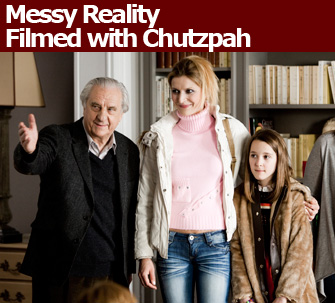
Director Anne Le Ny has the confidence and chutzpah to deal with a number of broad themes and moral ambiguities in her second movie, Les Invités de Mon Père (My Father’s Guest), ranging from problems of immigration and cultural difference in 21st-century France to sibling relationships and aging parents. And she manages to blend comedy with profundity in a delightful way.
When Lucien (Michel Aumont), a well-respected and highly principled humanitarian doctor in his 80s, takes an illegal immigrant, a young Moldovan woman, Tatiana (Veronica Novak), and her little girl into his home (an illegal act in France), his adult children, Babette (Karin Viard) and Arnaud (Fabrice Luchini) are hardly surprised, as they are well aware of his commitment to left-wing causes. However, when he announces that he has married her, it slowly becomes clear that Lucien’s reasons for looking after Tatiana are less lofty than they first thought.
Le Ny’s greatest coup is to let the audience discover the truth at the same time as Babette, who has modeled her life on her father’s example by becoming a doctor and working for disadvantaged people, and Arnaud, who has done the opposite by embracing the comfortable bourgeois world of business law. The film never makes it completely clear what really motivates Lucien (is it lust or love?) or Tatiana (is it cold-eyed opportunism or a genuine desire to put down roots?).
The other advantage of concentrating on the relationship between brother and sister is that we are treated to topnotch performances by Luchini (who has irritated me in previous movie roles) and Viard (who is always glorious). With just a glance, they manage to move from broad comedy to pathos. The script, written by Le Ny herself with Luc Béraud, is witty and fast-paced. (Arnaud’s comment that his elderly father’s antics have stolen from him the chance to get the most out of his mid-life crisis is typical of the movie’s style of humor.) Other nicely judged touches include Tatiana drinking champagne mixed with Fanta (her drink of choice) at a family gathering, Babette’s concern for the fate of her late mother’s favorite piece of furniture and Arnaud’s daughter replicating the activism of her grandfather.
I won’t give away the ending but will just say that it is refreshing to see that the resolution to the problems facing the family is rooted in uncomfortable reality rather than political correctness.
Favorite